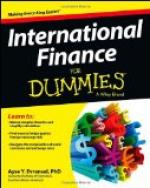Summing up the results of this rather discursive chapter we see that the chief benefit conferred on mankind by international finance is a quickening of the pace at which the wealth of the world is increased and multiplied, by using the capital saved by old countries for fostering the productive power of new ones. This is surely something solid on the credit side of the balance sheet, though it would be a good deal more so if mankind had made better progress with the much more difficult problem of using and distributing its wealth. If the rapid increase of wealth merely means that honest citizens, who find it as hard as ever to earn a living, are to be splashed with more mud from more motor-cars full of more road hogs, then there is little wonder if the results of international finance produce a feeling of disillusionment. But at least it must be admitted that the stuff has to be grown and made before it can be shared, and that a great advance has been made even in the general distribution of comfort. If we still find it hard to make a living, that is partly because we have very considerably expanded, during the course of the last generation or two, our notion of what we mean by a living.
As to the sinister influence alleged to be wielded by international finance in the councils of diplomacy, it has been shown that war on a great scale terrifies finance and inflicts great distress on it. To suppose, therefore, that finance is interested in the promotion of such wars is to suppose that it is a power shortsighted to the point of imbecility. In the case of wars which finance is believed with some truth to have helped to instigate, we have seen that it could not have done so if other influences had not helped it. In short, both the occurrence of the present war, and the circumstances that led up to war in Egypt and South Africa, have shown how little power finance wields in the realm of foreign politics. In the City if one suggests that our Foreign Office is swayed by financial influences one is met by incredulous mockery, probably accompanied by assertions that the Foreign Office is, in fact, neglectful, to a fault, of British financial interests abroad, and that when it does, as in China, interfere with financial matters, it is apt to tie the hands




